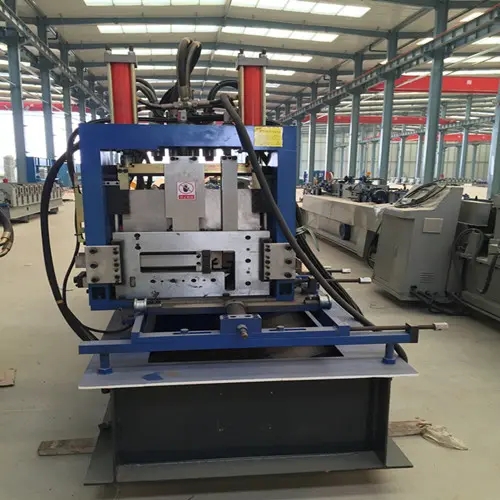
The Evolution and Importance of Drywall Stud Roll Forming Machines
The construction industry has witnessed significant advancements over the years, largely due to the advent of innovative machinery and technologies. Among these advancements, the drywall stud roll forming machine stands out as a crucial piece of equipment in the fabrication of drywall systems. This article explores the functionality, benefits, and significance of drywall stud roll forming machines in modern construction.
Understanding Drywall Stud Roll Forming Machines
Drywall stud roll forming machines are specialized pieces of equipment designed to create metal studs, which are essential components in drywall installation. These machines operate through a continuous process where metal sheets—typically Galvanized Steel or other suitable materials—are fed into the machine and shaped into desired profiles. The process involves rolling the flat sheets of metal through a series of forming stations, each designed to bend and shape the material into studs, tracks, or other framing components.
The versatility of these machines allows them to produce different sizes and thicknesses of studs, catering to varying construction needs. Common shapes produced by these machines include C-shaped and U-shaped studs, which are integral for providing structural support in walls and ceilings.
Key Advantages of Drywall Stud Roll Forming Machines
1. Efficiency and Speed One of the most significant advantages of drywall stud roll forming systems is their high level of efficiency. These machines can produce large quantities of studs in a relatively short time, thereby accelerating the construction process. In an industry where time is of the essence, such efficiency can lead to considerable cost savings.
2. Precision and Consistency Manual fabrication of studs can result in inconsistency and errors that may affect the overall quality of the construction. Roll forming machines, on the other hand, assure precision and uniformity in the production of studs, which is crucial for ensuring that all components fit together seamlessly during installation.

3. Material Conservation The roll forming process minimizes waste typically associated with traditional stud fabrication. Since the metal is formed into shape directly from sheets, there is less scrap material produced compared to processes that involve cutting and trimming raw materials.
4. Customization Modern drywall stud roll forming machines offer capabilities for customization, enabling manufacturers to produce specific sizes or profiles tailored to client needs. This flexibility is beneficial for contractors who require unique solutions for particular construction projects.
5. Durability and Strength Metal studs produced by roll forming machines are known for their durability and resistance to warping, making them an ideal choice for various applications. This strength is especially important in building structures that must withstand environmental stresses or potential hazards.
The Future of Drywall Stud Roll Forming Machines
As the construction landscape continues to evolve, drywall stud roll forming machines are expected to integrate more advanced technologies. Innovations such as automation and computer numerical control (CNC) are becoming more prevalent, enabling manufacturers to streamline operations further, enhance accuracy, and reduce labor costs.
Moreover, with a growing emphasis on sustainable construction practices, many manufacturers are exploring eco-friendly materials and processes for drywall stud production. This shift not only addresses environmental concerns but also meets the increasing demand for sustainable building solutions in the market.
Conclusion
In conclusion, drywall stud roll forming machines are indispensable tools in modern construction, delivering efficiency, precision, and customization that significantly contribute to the quality and speed of drywall installation. As technology continues to advance, we can expect these machines to evolve, further enhancing their capabilities and leading the way in innovative construction practices. Their role in the industry not only supports the practical aspects of building but also aligns with the broader trends of sustainability and efficiency in construction. Consequently, drywall stud roll forming machines will remain a cornerstone of effective and modern building methodologies for years to come.